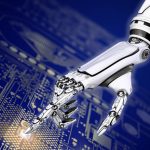 Computers are doing an increasing amount of work when it comes to scientific research, whether it’s doing basic number crunching, conducting virtual clinical trials, or using machine learning to identify fertile areas for exploration.
Computers are doing an increasing amount of work when it comes to scientific research, whether it’s doing basic number crunching, conducting virtual clinical trials, or using machine learning to identify fertile areas for exploration.
As the use of computers in research increases, will we eventually reach a stage where they are listed as an official author on the resulting papers? That’s an inevitability according to researchers from the University of Surrey.
They argue in a recent paper that computers should be legally granted patents for inventions they come up with. The paper suggests that existing patent law is ill equipped to handle anything ‘artificial’ in the invention process.
Artificial inventors
As computers play a growing role in the innovation process, the authors argue that the law needs to change to prevent innovation from being stifled by the lack of legal representation for the machines. It might also see conflicts emerging whereby humans take credit for work that wasn’t really there’s to take credit for.
By contrast, if computers were listed as inventors on a patent file, the authors suggest it would encourage greater investment in creative computing, although quite who benefits from the IP or can limit its use in such an instance is unclear.
“While some patent prosecutors say the ability of machines to create patentable inventions on their own is well off in the future, artificial intelligence has actually been generating inventive ideas for decades. In just one example, an artificial intelligence system named ‘The Creativity Machine’ invented the first cross-bristled toothbrush design,” the authors argue.
They believe that such artificial invention will become increasingly commonplace, and that it’s crucial that the legal system adapts to reflect that.
“Soon computers will be routinely inventing, and it may only be a matter of time until computers are responsible for most innovation. To optimise innovation — and the positive impact this will have on our economies — it is critical that we extend the laws around inventorship to include computers,” they continue.
Whilst it seems far fetched, the capabilities of computers are growing at an incredible pace, so it makes sense to explore the legal implications of this. As such, the paper represents a solid base from which to start discussions.